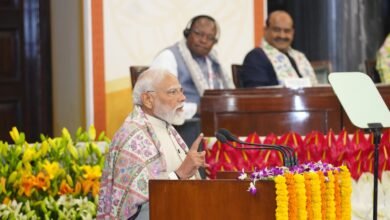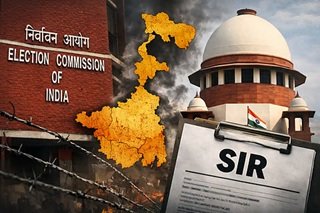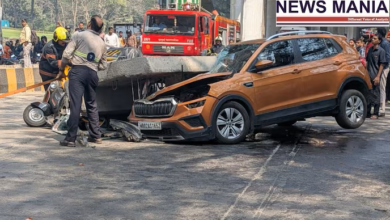Key Challenges Await Rekha Gupta As Delhi Chief Minister
Bornali Biswas -Editor in Chief -20th February 2025

Rekha Gupta’s recent appointment as Delhi’s Chief Minister marks a significant milestone, as she becomes the fourth woman to lead the capital. Her political journey, rooted in student leadership and extensive involvement with the Bharatiya Janata Party (BJP), has prepared her for this pivotal role. However, her administration faces a series of formidable challenges that require immediate and strategic attention.
1. Combating Severe Air Pollution
Delhi’s air quality has deteriorated alarmingly, with recent reports indicating pollution levels unprecedented in the past four decades. The city’s Air Quality Index (AQI) has frequently surpassed hazardous thresholds, with PM2.5 concentrations exceeding World Health Organization (WHO) recommended levels by over 130 times. This environmental crisis has led to health emergencies, school closures, and disrupted daily life. Addressing this issue necessitates comprehensive policies targeting vehicular emissions, industrial pollutants, and seasonal agricultural burning. Implementing stricter emission standards, promoting public transportation, and collaborating with neighboring states are critical steps in mitigating this environmental hazard.
2. Revamping Public Infrastructure
The rapid urbanization of Delhi has outpaced the development of its infrastructure, leading to congested roads, inadequate public transport, and strained utilities. Gupta’s administration must prioritize the expansion and modernization of the public transportation network, including buses and metro services, to provide efficient and affordable alternatives to private vehicles. Additionally, upgrading water supply systems, sewage treatment facilities, and waste management processes is essential to enhance the quality of life for Delhi’s residents. These initiatives require substantial investment and meticulous urban planning to accommodate the city’s growing population.
3. Ensuring Financial Stability Amidst Populist Promises
During the election campaign, the BJP made ambitious promises, including improvements in public education and the provision of free healthcare and electricity services. While these initiatives aim to uplift the socio-economic status of Delhi’s citizens, they pose significant financial challenges. Gupta’s government must devise strategies to fulfill these commitments without compromising the city’s fiscal health. This involves efficient resource allocation, curbing unnecessary expenditures, and exploring alternative revenue streams. Balancing welfare schemes with economic sustainability will be a delicate task requiring prudent financial management.
4. Navigating Political Dynamics and Governance
As a first-time Member of the Legislative Assembly (MLA), Gupta faces the intricate task of managing a complex political landscape. The BJP’s return to power in Delhi after nearly three decades signifies a shift in the city’s political dynamics. Building a cohesive administrative team, fostering collaboration among diverse political factions, and maintaining transparent communication with the public are essential for effective governance. Gupta’s leadership will be tested in her ability to unify various stakeholders and implement policies that reflect the electorate’s mandate.
5. Addressing Women’s Safety and Empowerment
Given her background and the BJP’s electoral focus on women’s issues, Gupta is expected to prioritize policies that enhance women’s safety and empowerment in Delhi. This includes strengthening law enforcement mechanisms to prevent gender-based violence, implementing educational programs that promote gender equality, and creating economic opportunities tailored for women. Establishing support systems for women in distress and ensuring their representation in various sectors will be pivotal in fostering an inclusive society.
6. Tackling Corruption and Enhancing Transparency
Delhi’s political environment has been marred by allegations of corruption, affecting public trust in governmental institutions. Gupta’s administration must prioritize anti-corruption measures by enforcing stringent accountability protocols, promoting digital governance to reduce bureaucratic red tape, and ensuring that public services are delivered efficiently and transparently. Restoring faith in the administration requires a steadfast commitment to ethical governance and the rule of law.
7. Managing Public Health Crises
The recent COVID-19 pandemic has underscored the vulnerabilities in Delhi’s healthcare infrastructure. Preparing for future public health emergencies involves investing in healthcare facilities, training medical personnel, and establishing robust response systems. Gupta’s government must also address ongoing health issues, such as vector-borne diseases and malnutrition, through comprehensive public health policies and community engagement.
8. Environmental Conservation Beyond Air Quality
Beyond air pollution, Delhi faces other environmental challenges, including water scarcity and the degradation of natural habitats. Implementing sustainable water management practices, protecting green spaces, and promoting renewable energy sources are essential steps toward environmental conservation. Gupta’s administration must integrate environmental considerations into urban development plans to ensure long-term ecological balance.
In conclusion, Chief Minister Rekha Gupta’s tenure begins amidst a confluence of pressing challenges. Her success will depend on her administration’s ability to implement strategic, inclusive, and sustainable solutions that address the multifaceted issues facing Delhi. Collaborative governance, fiscal prudence, and a commitment to public welfare will be the cornerstones of her leadership in navigating the complexities of the capital city.






